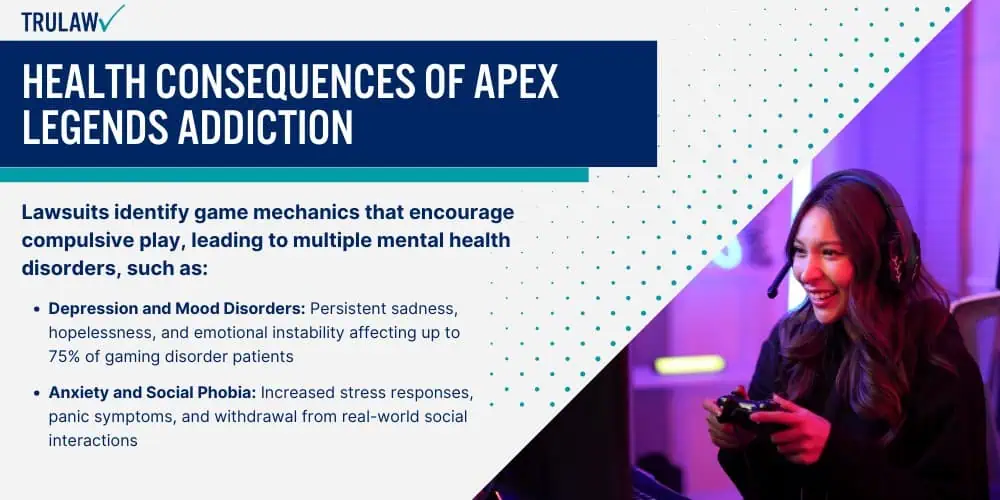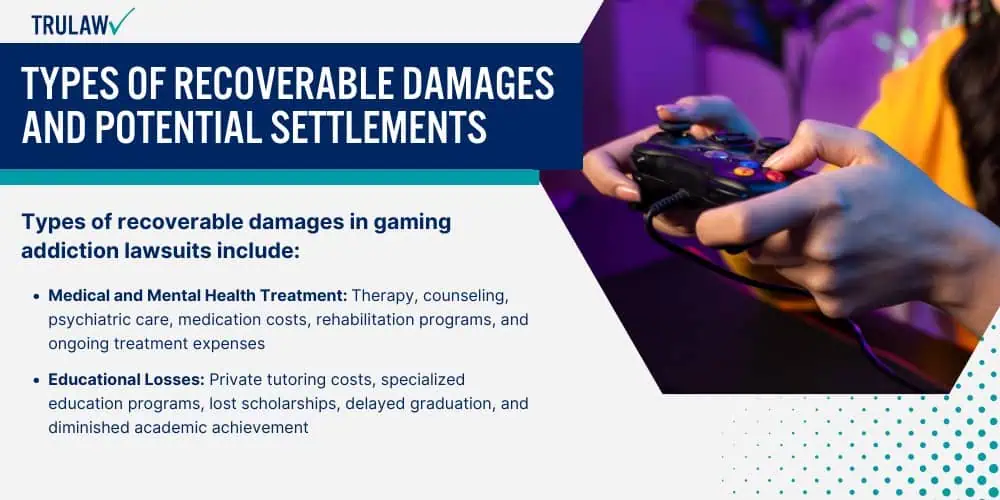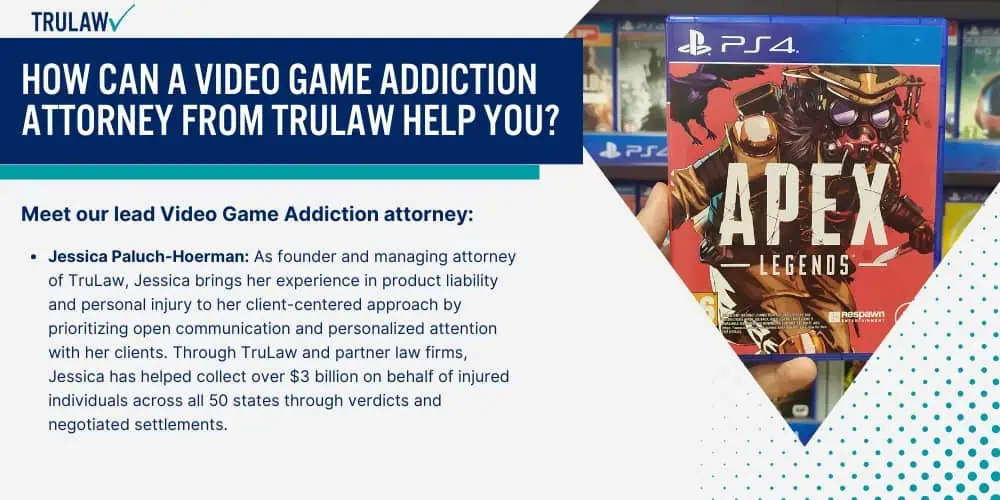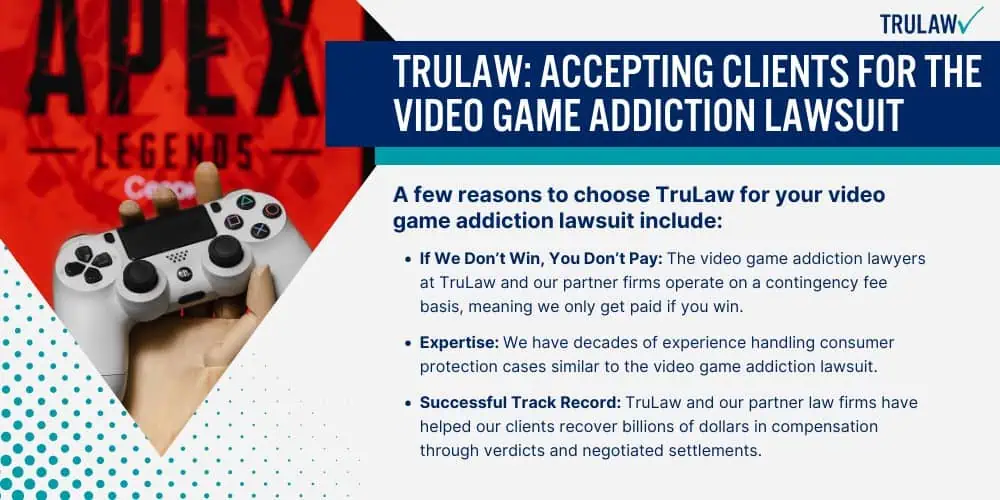Apex Legends employs sophisticated psychological manipulation techniques borrowed directly from casino gambling and behavioral psychology research to create compulsive engagement patterns that override rational decision-making, similar to mechanics used by video game developers across the gaming industry.
These features work synergistically through variable ratio reinforcement schedules, visual and auditory stimulation designed to trigger dopamine responses, and social pressure mechanics that exploit fear of missing out (FOMO) to keep players locked in endless gameplay loops.
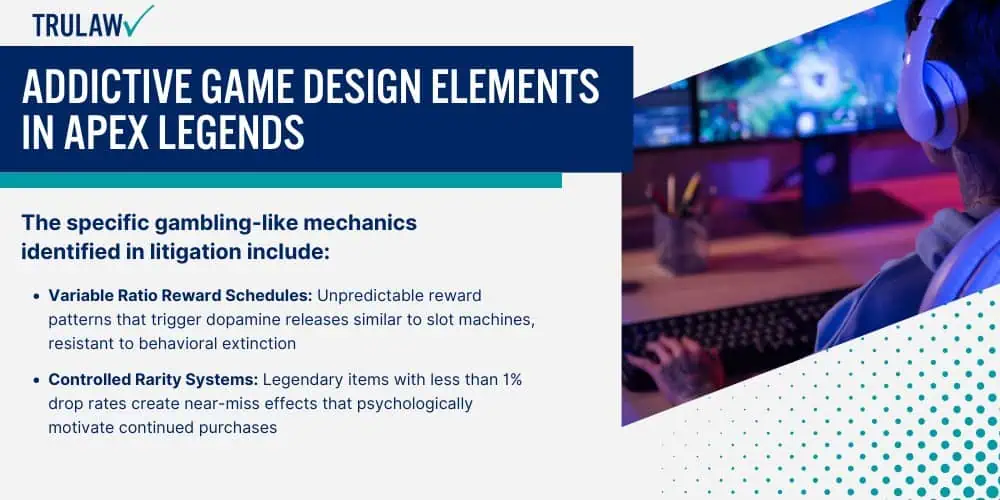
Internal industry documents increasingly reveal these mechanics are deliberately calibrated using real-time player data analytics to identify and exploit individual psychological vulnerabilities, particularly targeting developing adolescent brains that lack fully formed impulse control mechanisms.
When families contact TruLaw using the chat on this page, our legal team helps document how each manipulative feature contributed to their child’s gaming disorder and resulting damages.
Loot Boxes and Apex Packs: Gambling Mechanics
Families pursuing legal action against Electronic Arts, Respawn Entertainment, and other video game companies accused of predatory practices allege that Apex Legends deliberately employs gambling-like mechanics through its Apex Pack loot box system to exploit vulnerable players.
The lawsuits claim that these randomized reward-based systems trigger the same dopamine pathways and psychological responses as slot machines, creating patterns of excessive in game spending and addictive behavior that mirror problem gambling.
The Federal Trade Commission has raised concerns about loot box marketing techniques, noting they may encourage players to overspend or mask real costs through confusing terms.
The specific gambling-like mechanics identified in litigation include:
- Variable Ratio Reward Schedules: Unpredictable reward patterns that trigger dopamine releases similar to slot machines, resistant to behavioral extinction
- Controlled Rarity Systems: Legendary items with less than 1% drop rates create near-miss effects that psychologically motivate continued purchases
- Pity Timer Mechanics: “Bad luck protection” guaranteeing legendary items after 30 packs manipulates players into continued engagement
- Collection Event Packs: Limited-time exclusive loot boxes that exploit fear of missing out (FOMO) and urgency psychology
- Tiered Pack Systems: Standard, Thematic, Epic, and Legendary pack variations that escalate spending through artificial scarcity
- Visual and Audio Reinforcement: Two-second opening animations with glitter, lightning effects, and colored streaks designed to maximize anticipation and excitement
If you or a loved one experienced financial losses from Apex Legends loot box purchases or developed gambling-like behaviors from the game’s addictive mechanics, you may be eligible to seek compensation.
Contact TruLaw using the chat on this page to receive an instant case evaluation and determine whether you qualify to join others in filing an Apex Legends Addiction Lawsuit today.
Battle Pass and Seasonal Content Pressure
Electronic Arts and Respawn Entertainment face mounting legal challenges over Apex Legends’ alleged use of psychologically manipulative seasonal content systems designed to exploit vulnerable players, particularly minors (similar to tactics used in violent video games like Rockstar Games’ Grand Theft Auto series).
The lawsuits claim that the game’s battle pass structure and time-limited events create artificial urgency and fear of missing out (FOMO), compelling players to engage in prolonged gaming sessions and spend money on in-game purchases.
These legal actions argue that EA deliberately employs gambling-like mechanics and psychological tactics when designing games (similar to tactics used in casinos), triggering dopamine responses that reinforce compulsive gaming behaviors without providing adequate warnings about addiction risks.
The litigation specifically identifies several predatory design features that foster addiction through seasonal pressure:
- Battle Pass System: Time-gated rewards that expire each season, forcing players to maintain consistent play schedules or lose paid content
- Limited-Time Events: Exclusive challenges and rewards that disappear permanently, creating psychological pressure to participate
- Apex Packs and Loot Boxes: Randomized reward mechanics that exploit the same psychological vulnerabilities as gambling
- Collection Events: Special themed events requiring extensive play or payment to unlock exclusive cosmetics before they vanish
- Seasonal Exclusivity: Skins and items that cannot be obtained after their season ends, maximizing FOMO effects
- Daily and Weekly Challenges: Recurring tasks that punish players for missing days, encouraging unhealthy daily engagement
- Tiered Progression Systems: Multiple overlapping progression tracks that require excessive time investment to complete
- Squad-Based Social Pressure: Team dynamics that make players feel obligated to continue sessions to avoid disappointing teammates
Plaintiffs seek damages for mental health treatment, lost productivity, financial harm from microtransactions, and the developmental impact on minors who have suffered from gaming addiction – with many video game companies facing similar allegations.
Psychological Reward Systems and Dopamine Triggers
Apex Legends uses carefully crafted intermittent reinforcement schedules that combine predictable rewards (experience points, battle pass progression) with random rewards (loot boxes, match outcomes) to create maximum psychological dependence mirroring substance addiction patterns.
The game’s 60-player battle royale format mathematically ensures most players lose 95% of matches, paradoxically driving continued play through near-miss psychology where second-place finishes feel tantalizingly close to victory to activate the same neural pathways as gambling losses that almost won, leading to excessive gaming habits that damage players’ well being.

